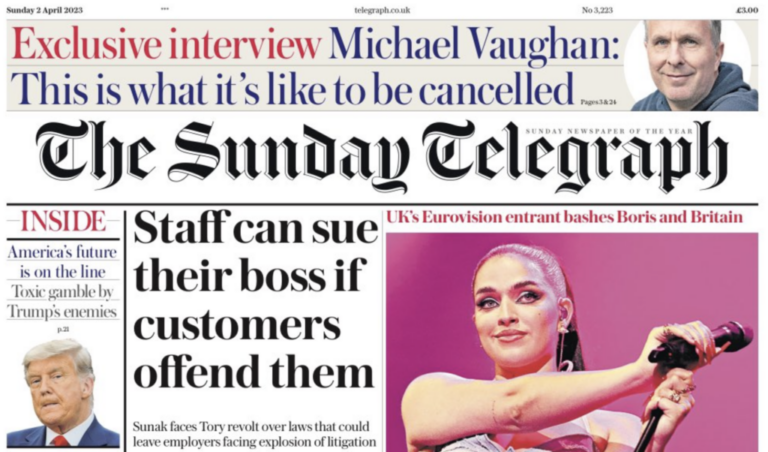The FSU has been briefing supporters across both Houses of Parliament on the Worker Protection (Amendment to Equality Act 2010) Bill and it’s good to see that our efforts to flag up the threat this legislation poses to free speech and freedom of expression are starting to gain media traction.
Yesterday’s Sunday Telegraph carried a front-page piece on a growing Tory revolt over the government’s backing for the bill, while a strong editorial in that same paper urged Rishi Sunak to think again, pointing out that if the proposed legislation reaches the statute books unamended it will “cause havoc both for private-sector business and for public services, including the police and the NHS”.
This legislation – a private members’ bill – seeks to expand the legal duty set out in the Equality Act 2010 that requires employers to protect workers from harassment by other employees defined as “unwanted conduct relating to a protected characteristic” (i.e., age, disability, gender reassignment, race, religion or belief, sex or sexual orientation) where that conduct has the purpose or effect of “creating an intimidating, hostile, degrading, humiliating or offensive environment”.
With the government’s backing, the bill’s two Lib Dem sponsors – Wera Hobhouse MP and Baroness Burt of Solihull – want to make bosses additionally liable for harassment of their employees by members of the public that they come into contact with while doing their jobs.
This requirement presents a particular challenge to employers with public-facing staff because it makes them legally liable if they fail to take what Clause 1 of the Bill as drafted describes as “all reasonable steps to prevent third-parties” from harassing their employees.
Following pressure from the FSU, the government has amended the Bill so speech that involves “an expression of opinion on a political, moral, religious or social matter” is protected. That’s better, but still not great. What about pub banter and football chants, for instance?
And as Lord Strathcarron pointed out in a terrific speech in the House of Lords last week, what will become of book launches? “Would Waterstones, for example, risk an in-store book signing by JK Rowling or Helen Joyce on the off-chance that one of the author’s fans might be wearing a T-shirt that says, ‘Woman Equals Adult Human Female’, knowing that an employee could sue for hurt feelings – real or vexatious?” he asked.
You might think a government led by Rishi Sunak would be a little more circumspect when it comes to supporting legislation that will turbo-charge the Equality Act’s ineluctable “mission creep” – he was, after all, the candidate during last year’s Conservative Party leadership election who went out of his way to describe that legislation as “a Trojan horse that has allowed every kind of woke nonsense to permeate public life”.
And yet much like the inhabitants of Troy, cheerily wheeling their ‘gift of peace’ back behind the city walls, Mr Sunak’s government appears oblivious to the threat posed by this legislation, simply waving it through the Commons without a vote on a Friday sitting when most MPs weren’t in Westminster but back in their constituencies.
According to the Sunday Telegraph, senior Tories are now warning that the free speech protections included in the amended legislation do not go far enough.
Jacob Rees-Mogg, the former Business Secretary, said establishments that “serve the public can expect to run a police state in their business”, while Sir John Hayes, the chairman of the Common Sense Group of Tory MPs, said it had “sinister implications”. Another Conservative MP, Craig Mackinlay, said he believed the change was “draconian”. FSU Advisory Council member Lord David Frost described the Bill as a “woke, socialist measure” that would “have a chilling effect on every conversation in a workplace”.
The FSU is calling on the Minister for Women and Equalities, Kemi Badenoch, to rethink the bill. With hospitality venues struggling to survive rising energy costs, soaring inflation and a rise in corporation tax, more red tape is the last thing they need. At the very least, the Government should make commencement of all the clauses other than the ones dealing with sexual harassment contingent on a proper consultation with all the sectors likely to be affected.
You can read our briefing note on the Worker Protection Bill here.




